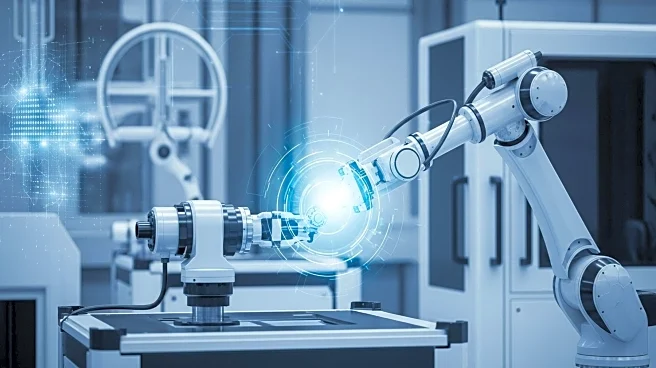What is the story about?
What's Happening?
Manufacturers are increasingly investing in artificial intelligence (AI) and automation to enhance business operations and attract skilled talent. A recent roundtable discussion highlighted the need for manufacturers to rethink their workforce strategies to avoid being left behind. Research by IFS indicates that 65% of manufacturers are digital laggards, relying on outdated systems, while fewer than 10% are digital leaders. The industry faces challenges such as technological disruption, cybersecurity risks, and climate change. To address these, manufacturers are implementing AI pilot projects to optimize shipping routes, improve procurement, and enhance cash flow. Companies like Schneider Electric are focusing on attracting and developing talent by offering compelling career paths and fostering a culture of continuous learning.
Why It's Important?
The integration of AI in manufacturing is crucial for maintaining competitiveness and addressing industry challenges. As manufacturers adopt AI, they can improve efficiency, reduce costs, and create new roles such as AI engineers and data scientists. This transformation is essential for attracting talent with technological skills, as the sector struggles with a stigma of being dirty and dangerous. By rebranding as technology-driven companies, manufacturers can appeal to a broader workforce and ensure long-term sustainability. The successful implementation of AI can lead to increased productivity and innovation, positioning manufacturers to better compete in the global market.
What's Next?
Manufacturers are expected to continue investing in AI and digital technologies, with a focus on small pilot projects that demonstrate return on investment. These projects will help build momentum for scaling and adoption, requiring constructive feedback and active employee engagement. As AI strategies develop, manufacturers must involve their workforce at every stage to ensure successful implementation and adaptation. This includes retraining employees in digital troubleshooting and embedding digital ethics in governance. The industry will likely see a shift towards more technology-driven operations, with AI playing a central role in shaping the future of manufacturing.
Beyond the Headlines
The adoption of AI in manufacturing has broader implications for workforce dynamics and industry perception. As manufacturers embrace digital transformation, they must address ethical considerations related to data usage and transparency. Building trust with employees and ensuring they understand the personal relevance of AI is crucial for successful integration. This shift also presents an opportunity to redefine the image of manufacturing as an innovative and attractive career option, potentially leading to a cultural change within the industry.
















